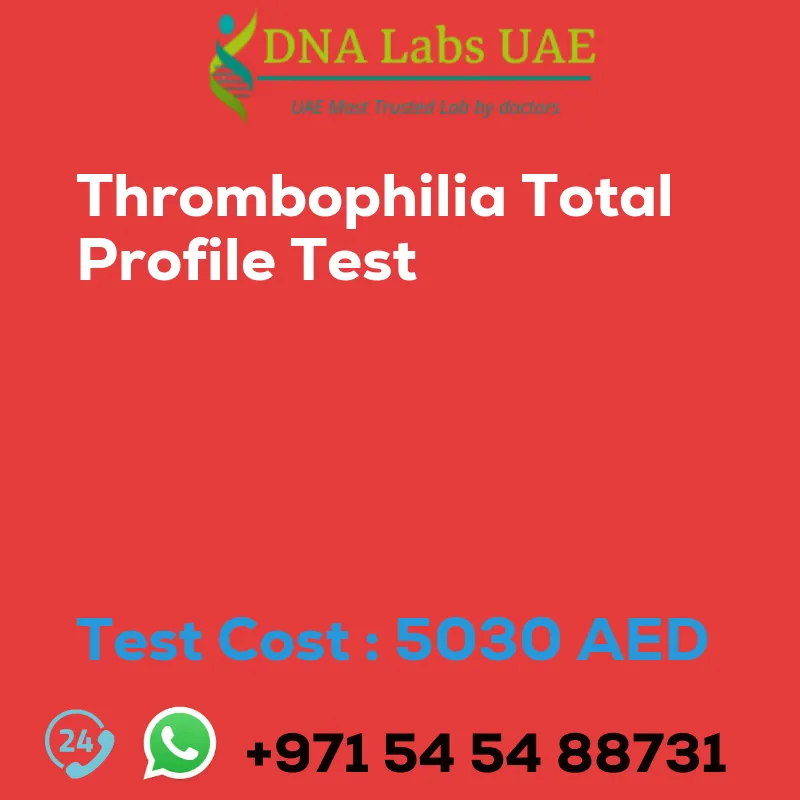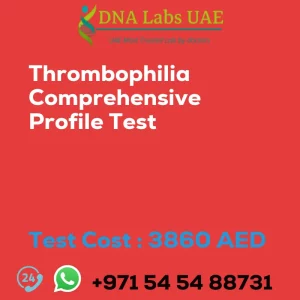THROMBOPHILIA TOTAL PROFILE Test
At DNA Labs UAE, we offer the THROMBOPHILIA TOTAL PROFILE test to evaluate individuals who are at risk for developing abnormal blood clots. Thrombophilia refers to a condition where there is an increased tendency for blood clot formation.
Test Components:
- Protein C, Functional
- Protein S Antigen, Free
- Antithrombin Activity Functional
- Mixing studies APTT
- Lupus anticoagulant panel
Test Price:
AED 5030.0
Sample Condition:
6 mL whole blood in 2 Blue Top (Sodium Citrate) tubes. Mix thoroughly by inversion. Transport to Lab within 4 hours. If this is not possible, make PPP within 1 hour of collection as follows: Centrifuge sample at 3600 rpm for 15 min. & transfer supernatant to a clean plastic tube. Centrifuge this supernatant again at 3600 rpm for 15 mins. & finally transfer the supernatant (PPP) to 1 labelled, clean plastic screw capped vial. FREEZE IMMEDIATELY. Ship frozen. DO NOT THAW. Overnight fasting is preferred. Duly filled Coagulation Requisition Form (Form 15) is mandatory AND 3 mL (2 mL min.) whole blood in 1 Lavender Top (EDTA) tube. Ship refrigerated AND 3 mL (1 mL min.) serum from 1 SST. Ship refrigerated or frozen. It is recommended that the patient discontinues Heparin for 1 day and Oral Anticoagulants for 7 days prior to sampling as these drugs may affect test results. Discontinuation should be with prior consent from the treating Physician.
Report Delivery:
Sample Mon / Thu by 9 am; Report Wed / Sat
Method:
Chromogenic Assay, Electromechanical Clot Detection, Photo-optical Clot Detection, Immunoturbidimetry, Enzyme Immunoassay, Real Time PCR, Chemiluminescent Microparticle Immunoassay
Test Type:
Disorders of Coagulation
Doctor:
Hematologist
Test Department:
COAGULATION
Pre Test Information:
Overnight fasting is preferred. Duly filled Coagulation Requisition Form (Form 15) is mandatory. It is recommended that the patient discontinues Heparin for 1 day and Oral Anticoagulants for 7 days prior to sampling as these drugs may affect test results. Discontinuation should be with prior consent from the treating Physician.
Test Details:
The Thrombophilia Total Profile test is a comprehensive panel of tests used to evaluate individuals who are at risk for developing abnormal blood clots. Thrombophilia refers to a condition where there is an increased tendency for blood clot formation. The Thrombophilia Total Profile test typically includes several different tests, such as:
- Factor V Leiden Mutation Analysis: This test looks for a specific genetic mutation called Factor V Leiden, which is a common cause of inherited thrombophilia.
- Prothrombin Gene Mutation Analysis: This test detects a mutation in the prothrombin gene, which is another genetic risk factor for thrombophilia.
- Antithrombin Activity: Antithrombin is a natural anticoagulant protein in the blood. This test measures the activity of antithrombin to determine if there is a deficiency, which can increase the risk of abnormal blood clot formation.
- Protein C Activity: Protein C is another natural anticoagulant protein. This test measures the activity of protein C to assess if there is a deficiency, which can lead to an increased risk of blood clots.
- Protein S Activity: Protein S is a cofactor for protein C and is also involved in the regulation of blood clotting. This test measures the activity of protein S to determine if there is a deficiency, which can increase the risk of thrombophilia.
- Lupus Anticoagulant: This test detects the presence of lupus anticoagulant antibodies, which can interfere with the normal clotting process and increase the risk of abnormal blood clot formation.
- Homocysteine: Elevated levels of homocysteine in the blood have been associated with an increased risk of thrombophilia. This test measures the level of homocysteine to assess the risk.
The Thrombophilia Total Profile test is usually ordered by a healthcare provider if a person has a personal or family history of blood clots, recurrent miscarriages, or unexplained thrombosis. The results of the test can help guide treatment decisions, such as the use of blood thinners or other preventive measures to reduce the risk of blood clots.
| Test Name | THROMBOPHILIA TOTAL PROFILE Test |
|---|---|
| Components | *Protein C, Functional*Protein S Antigen, Free *AntithrombinActivityFunctional *Mixing studies APTT*Lupus anticoagulant panel |
| Price | 5030.0 AED |
| Sample Condition | 6 mL whole blood in 2 Blue Top (Sodium Citrate) tubes. Mix thoroughly by inversion. Transport to Lab within 4 hours. If this is not possible, make PPP within 1 hour of collection as follows: Centrifuge sample at 3600 rpm for 15 min. & transfer supernatant to a clean plastic tube. Centrifuge this supernatant again at 3600 rpm for 15 mins. & finally transfer the supernatant (PPP) to 1 labelled, clean plastic screw capped vial. FREEZE IMMEDIATELY. Ship frozen. DO NOT THAW. Overnight fasting is preferred. Duly filled Coagulation Requisition Form (Form 15) is mandatory AND 3 mL (2 mL min.) whole blood in 1 Lavender Top (EDTA) tube. Ship refrigerated AND 3 mL (1 mL min.) serum from 1 SST. Ship refrigerated or frozen. It is recommended that patient discontinues Heparin for 1 day and Oral Anticoagulants for 7 days prior to sampling as these drugs may affect test\nresults. Discontinuation should be with prior consent from the treating Physician. |
| Report Delivery | Sample Mon / Thu by 9 am; Report Wed / Sat |
| Method | Chromogenic Assay, Electromechanical Clot Detection, Photo-optical Clot Detection, Immunoturbidimetry, Enzyme Immunoassay, Real Time PCR, Chemiluminescent Microparticle Immunoassay |
| Test type | Disorders of Coagulation |
| Doctor | Hematologist |
| Test Department: | COAGULATION |
| Pre Test Information | Overnight fasting is preferred. Duly filled Coagulation Requisition Form (Form 15) is mandatory. It is recommended that patient discontinues Heparin for 1 day and Oral Anticoagulants for 7 days prior to sampling as these drugs may affect test results. Discontinuation should be with prior consent from the treating Physician. |
| Test Details | The Thrombophilia Total Profile test is a comprehensive panel of tests used to evaluate individuals who are at risk for developing abnormal blood clots. Thrombophilia refers to a condition where there is an increased tendency for blood clot formation. The Thrombophilia Total Profile test typically includes several different tests, such as: 1. Factor V Leiden Mutation Analysis: This test looks for a specific genetic mutation called Factor V Leiden, which is a common cause of inherited thrombophilia. 2. Prothrombin Gene Mutation Analysis: This test detects a mutation in the prothrombin gene, which is another genetic risk factor for thrombophilia. 3. Antithrombin Activity: Antithrombin is a natural anticoagulant protein in the blood. This test measures the activity of antithrombin to determine if there is a deficiency, which can increase the risk of abnormal blood clot formation. 4. Protein C Activity: Protein C is another natural anticoagulant protein. This test measures the activity of protein C to assess if there is a deficiency, which can lead to an increased risk of blood clots. 5. Protein S Activity: Protein S is a cofactor for protein C and is also involved in the regulation of blood clotting. This test measures the activity of protein S to determine if there is a deficiency, which can increase the risk of thrombophilia. 6. Lupus Anticoagulant: This test detects the presence of lupus anticoagulant antibodies, which can interfere with the normal clotting process and increase the risk of abnormal blood clot formation. 7. Homocysteine: Elevated levels of homocysteine in the blood have been associated with an increased risk of thrombophilia. This test measures the level of homocysteine to assess the risk. The Thrombophilia Total Profile test is usually ordered by a healthcare provider if a person has a personal or family history of blood clots, recurrent miscarriages, or unexplained thrombosis. The results of the test can help guide treatment decisions, such as the use of blood thinners or other preventive measures to reduce the risk of blood clots. |







